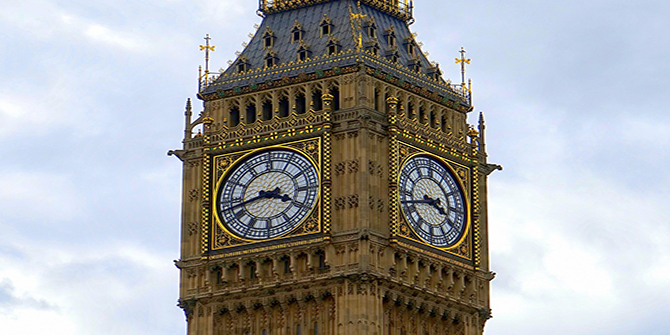 A pact with the DUP is the best outcome Theresa May could hope for in the absence of an outright majority, while the DUP could not have dreamed up a better situation for themselves, writes Matthew Whiting. Although the focus has been on DUP’s beliefs on abortion, LGBT rights, and climate change, those views will not set the agenda, he argues. The real cost will instead be felt by reviving the West Lothian question and hindering relations in Northern Ireland.
A pact with the DUP is the best outcome Theresa May could hope for in the absence of an outright majority, while the DUP could not have dreamed up a better situation for themselves, writes Matthew Whiting. Although the focus has been on DUP’s beliefs on abortion, LGBT rights, and climate change, those views will not set the agenda, he argues. The real cost will instead be felt by reviving the West Lothian question and hindering relations in Northern Ireland.
On election night in 2015 I was sitting in a TV studio in Belfast being asked to comment on an unexpected exit poll and without a clue of what to say. The exit poll predicted that David Cameron’s Conservatives would need the support of an extra 7-10 seats to sustain a government. DUP representatives in the studio with me were thrilled at the prospect, sensing an opportunity and seeing the fear in the eyes of their Sinn Féin counterparts! As the evening progressed and it became clear that the Conservatives were going to win an outright majority, DUP disappointment was palpable. Then on 9 June 2017, the DUP found themselves in the position they clearly longed for two years earlier.
When it comes to including the DUP in some kind of confidence-and-supply agreement, Theresa May has possibly found the ideal partner. The DUP should be loyal and cohesive, and governments that only rely on one small partner often have high survival rates. Indeed, the bigger threat to the survival of any minority Conservative government will be from its own backbenchers. Also, because Northern Ireland’s party system is entirely different from the rest of Britain (the main British parties don’t even bother to field candidates in Northern Ireland), electoral competition between the governing partners won’t get in the way of doing business.
So what exactly will be the consequences of the DUP propping up a Conservative government?
The impact on the Conservative agenda will most likely be fairly negligible. Of course the DUP will demand a price is paid, probably in money and symbolism. But the party won’t demand anything that gets noticed on a day-to-day basis in mainland Britain. Most of the policies the DUP seek will relate to areas that are devolved to Northern Ireland, such as more investment in regional healthcare, education, pensions, social security, and job creation.
So although Northern Ireland’s reliance on the public sector, combined with the DUP’s desire to gain concessions for its working class base, may challenge the Conservatives austerity agenda, if this is primarily restricted to Northern Ireland it shouldn’t stand in the way of an agreement. It won’t be hard for May to pitch this spending as aligning with her focus on those families that are ‘Just About Managing’. Other policies the DUP will demand will probably chime well with the Conservative agenda anyway, like investing in national policing and renewing Trident.
The DUP will also seek symbolic gestures from Westminster to show its closeness to Stormont and Northern Ireland. A few key speeches and firm statements by the government about its commitment to the Union should do the job and it will be an easy concession for the Conservative and Unionist Party, to give the party its full official name.
Much is being made of the DUP’s highly illiberal stance on abortion and gay marriage combined with their religious tendencies and how this will sit in the remarkably secular world of Westminster politics. But the idea that the DUP will somehow set the agenda on Great Britain’s moral policy is laughable. Ruth Davidson needing to extract assurances that a DUP deal won’t impact gay marriage in Scotland is nothing more than posturing. Besides, if she is looking for opponents of gay marriage, possible front benchers like Stephen Crabb and Liam Fox are much closer at hand.
But this does bring us to one major problem a DUP deal may face. The Conservatives might only get certain legislation that affects England (and has no relevance for Northern Ireland) passed using the support of Northern Irish MPs – the return of the ‘Westlothian Question’ but from Northern Ireland rather than Scotland! This could seriously increase popular disgruntlement with English voters and reduce the people’s accountability over the government.
When it comes to Brexit, the DUP is walking a bit of a tightrope. Sinn Féin is currently attempting to use the threat of a restored border between Northern Ireland and the Republic as a reason for having a referendum on seceding from the UK. Although the DUP has a long Eurosceptic history and wants to leave the EU and customs union, it wants to maintain a ‘frictionless’ border with the Republic of Ireland to cut off Sinn Féin’s gripes and to ensure cross-border business.
No easy solution is in sight as long as May insists on restricting free movement. Westminster has tentatively floated the idea of moving the border to mainland Britain, but this would be unpalatable to the DUP. It would create a sense of Northern Ireland being apart from the rest of the UK – exactly the opposite of what the DUP wants. The main hope will be that because Britain and Ireland’s constitutional, political, and economic relationship predates the EU, sustaining open borders will be possible outside the confines of the EU once again. In other words, the DUP is anti-EU while still wanting to retain the benefits of membership – sound familiar much?
If it is cheap and relatively easy for the Conservative Party to buy the loyal support of the DUP, the cost will be borne by power-sharing and community relations in Northern Ireland. With the Northern Ireland Assembly currently on hold due to tensions between the DUP and Sinn Féin (certainly not the first crisis in recent years over cultural and symbolic conflicts between nationalists and unionists) restoring Stormont will be significantly harder if a Conservative-DUP deal goes ahead.
The Secretary of State for Northern Ireland has always claimed to be a neutral broker between the two communities, intent on helping them to find the best policy for Northern Ireland and upholding the will of the people. But claims to neutrality by James Brokenshire (or whoever his successor may be) when undertaking negotiations to restore devolution will ring very hallow indeed if he is only in his job thanks to the DUP propping up his government. Indeed, every time Westminster appears to side with the DUP, this will lead Sinn Féin (rightly or wrongly) to cry foul.
Also, with May using recent terror attacks to pursue a long-standing Conservative policy of loosening Britain’s ties to the European Convention on Human Rights, something the DUP too would welcome, this will immediately raise fears within Sinn Féin which puts equality and rights protection to the forefront of its agenda.
Any Conservative-DUP deal will probably make winners of both of these parties and it is the best outcome May could hope for given the election results. The real cost will be felt by reviving the West Lothian question and hindering relations in Northern Ireland. But with the anniversary of the partition of Ireland and formation of Northern Ireland approaching in 2021, the DUP would dearly love to be close to the reins of Westminster power and showing the strength of ties between Belfast and London, not Belfast and Dublin. The party could not have dreamed up a better scenario for themselves.
______
 Matthew Whiting is a Research Associate in the Centre for Trust, Peace and Social Relations at the University of Coventry. His book entitled ‘From Revolution to Moderation: The Transformation of Sinn Féin and the IRA’ is coming out with Edinburgh University Press later this year.
Matthew Whiting is a Research Associate in the Centre for Trust, Peace and Social Relations at the University of Coventry. His book entitled ‘From Revolution to Moderation: The Transformation of Sinn Féin and the IRA’ is coming out with Edinburgh University Press later this year.








I know the popular vote counts for little in the limited democracy which we are allowed to have in the UK but….
The Conservative / DUP civil partnership is supported by a total of 13.99 million votes.
A Progressive Alliance of Labour / SNP / Lib Dem / Plaid Cymru / Green is supported by 16.94 million votes.
For every 100 voters who support Con / DUP, 121 support a Progressive Alliance.
Propping up the Tories to the ire of half of Britain will put the DUP and the UDA under an intense spotlight. Many of JC’s supporters may have no memory of the Troubles and sadly NI news barely makes the mainstream media here let alone widespread social media. That will change. Partnering with Theresa for some immediate power gains may be very shortsighted. Although a Tory DUP partnership may benefit them both in the short term (and harm everyone else esp NI) whether it would in the long term is not so clear…
I don’t know if I’m being silly here, but I think the panic over the DUP is overblown. As well as the 10 DUP votes, Theresa May’s Conservatives need Ruth Davidson’s 13 Scottish Conservatives to get anything through, and there is no chance they’re going to put up with measures put in front of them just because it’s good for the Tory party south of the border. She’s too independent, while her 12 new MPs have not been reliant on an MP’s salary before now, and won’t be scared to give that up for the sake of their consciences. A 3-line whip in a hung parliament is a ridiculous notion, so Mrs. May will be forced to listen to other opinions, including those of the other nations, instead of treating them as lobby-fodder.
I am, however, worried about the effect on Northern Ireland of the Tory party taking the DUP under its wing. Dealing with that is going to take delicate diplomacy – not something for which Theresa May is well known.
How is the DUP wanting the situation with the Irish border, which predates the eu, wanting to retain any so called called benefit of eu membership?